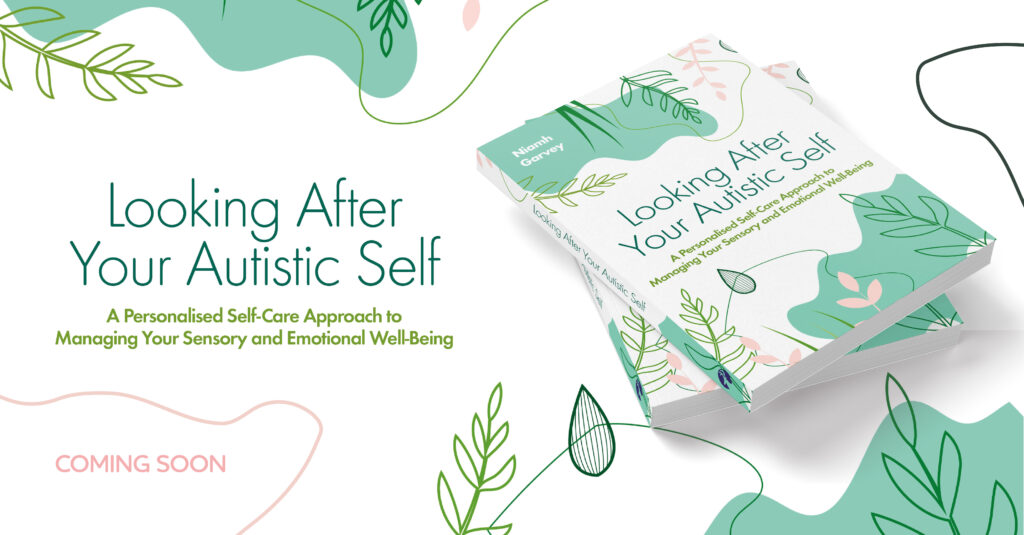
Learning to seek strategies, instead of masking my autistic self
Niamh Garvey, author of the upcoming ‘Looking After Your Autistic Self,’ reflects on her journey to recognising her autistic self after years of masking. She also shares how she came to the decision of sharing the tips and strategies she learned, and the benefits she’s experienced since supporting her autism rather than hiding it.
Being able to hold a mask over your autism, does not mean that you are not autistic. It took me a long time to realise this, and is the reason that I thought I couldn’t possibly be autistic for so long. I assumed that because I knew how to hide my autistic traits, and I knew that I needed to use multiple strategies to cope with daily life, meant that I was simply a bit odd and anxious, but not autistic. This changed when I began studying a Diploma in Autism Studies, in order to understand my daughter’s autism.
When my daughter was diagnosed as autistic, I was confused. People kept telling me that she couldn’t be autistic; she was too chatty, too social, too bright. My own understanding of autism was shaped by stints in residential care facilities when I was a student nurse. I had worked with autistic adults with intellectual disability, who needed assistance with everything from getting dressed to using the bathroom to staying safe in everyday environments.
I had also volunteered as a teenager in a summer camp for kids with disabilities, and all the autistic kids I could remember were nothing like my daughter; they required help and care for every aspect of daily life. But my daughter could feed herself, was toilet trained, was able to have full conversations, and was startlingly intelligent.
I didn’t know how to match my daughter’s autism to the autistic people I remembered. And I certainly couldn’t match myself to them, despite having noticed that I had an uncanny ability to know what these people needed at any given time. I remember the nurses being amazed that I could always tell what sensory stimulus was stressing the autistic residents, and what they were trying to communicate non-verbally. I was told I had a “magic touch”. But secretly, I couldn’t understand why the nurses didn’t recognise the sensory stressors themselves, since they bothered me too. Unlike the people I was caring for, I simply knew how to force my distress inside, and to do little tricks to cope with them, like sitting with my back to an annoying light, or turning loud music down.
In order to understand how autism could be so different in different people, I began studying for a two-year Diploma in Autism Studies at University College Cork. As I sat through my lectures, I was amazed to notice that I had countless autistic traits, and I began to seriously question whether I was autistic myself. But surely I couldn’t be, I thought. Didn’t I use tricks to hide these autistic traits? I held in my stims, and I practiced facial expressions in the mirror, and I wrote out conversations before they happened to help me prepare for social interaction.
I used strategies to get through the stresses of daily life; surely an autistic person wouldn’t know to do that? They wouldn’t know to cook a double portion of dinner one day, because the next day they’d be too overwhelmed to cook after a social event. An autistic person wouldn’t know to carry soap in their pocket to drown out the smells at a food market… would they? I assumed that if I knew to use strategies and tricks to hide my quirks, and to cope, then I couldn’t be autistic. How wrong I was.
The first time I heard about masking (which means hiding your autistic traits), a lightbulb lit up in my head. I finally realised that knowing how to hide my autism didn’t make me any less autistic.
Getting diagnosed with autism was the most liberating thing I can remember in my whole life. Everything finally made sense, and I could now understand why I was different, and how my autism affected my life. I began to share my experiences and strategies with my classmates and lecturers in the Diploma. Then one day, a lecturer stopped the lecture and told me to write a book. She said people would benefit from me sharing my strategies.
At first, I felt like I couldn’t possibly be so presumptuous as to think that I could help other autistic people by writing a book. I felt like an amateur autistic person, compared to all those real autistic people who had known they were autistic for years. But when I began to suss-out the autistic community, I realised that quality education about autism was not necessarily widespread. I realised just how much the Diploma had taught me, and that this education was a privilege. The thought of sharing this privilege helped me to start writing the book.
Education helped me to completely change how I approach my oddities, quirks, sensory triggers, and anxieties. I stopped masking my autistic self and started supporting it instead. This drastically improved my mental health, and has led to a much more balanced life for me. I hope my book will help other autistic adults to understand and support their autism, and to pass on their own strategies in turn. Education is catching, but it can’t spread unless it is shared. The more education there is about autism in the world, the better all our futures will be.
Looking After Your Autistic Self by Niamh Garvey is available to order.
If you liked this article, why not join our mailing list to receive exclusive content and discounts? Sign up to the mailing list here.